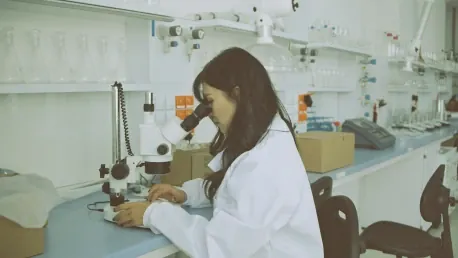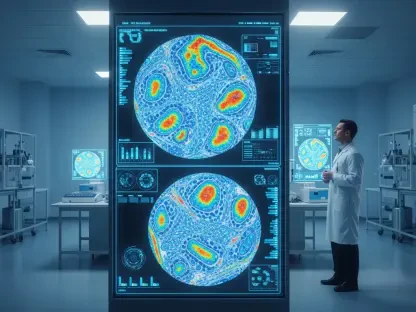The global bioinformatics market is witnessing unprecedented growth, driven by significant advances in sequencing technologies and heightened interest in personalized medicine. As bioinformatics continues to evolve, its impact on drug discovery and genomic research becomes increasingly profound. This interdisciplinary field, which combines computer science, mathematics, physics, and biology, creates software tools and methods for managing and analyzing large volumes of biological data. The integration of innovative technologies and strategic collaborations demonstrates the transformative potential of bioinformatics in shaping the future of drug discovery and genomics.
Advances in Sequencing Technologies
Technological breakthroughs in next-generation sequencing (NGS) have dramatically transformed bioinformatics. NGS technology has drastically reduced costs and the time required for genomic and proteomic research, facilitating the accumulation of vast datasets. These extensive datasets drive the demand for sophisticated bioinformatics tools to manage and analyze data efficiently. The reduction in sequencing costs has democratized access to genomic information, making it feasible for a broader range of research institutions and companies to engage in cutting-edge genomic studies. Furthermore, the advancements in sequencing accuracy enhance the reliability of the data obtained, which is critical for subsequent bioinformatic analysis.
The surge in sequencing capabilities has seen a parallel rise in the development of bioinformatics algorithms and software dedicated to processing and interpreting large volumes of genetic information. As researchers navigate through immense datasets generated by NGS, bioinformatics tools enable them to derive meaningful insights about genetic variations, disease associations, and potential therapeutic targets. The sophisticated analysis facilitated by bioinformatics not only accelerates discoveries but also provides a deeper understanding of complex biological processes. As sequencing technologies continue to advance, bioinformatics tools and methods evolve, ensuring that researchers can manage, integrate, and interpret the ever-growing volumes of data effectively.
Government Initiatives and Funding
Government initiatives and substantial funding for genomics research play an essential role in the bioinformatics market’s expansion. Governments globally acknowledge the critical importance of genomic studies in advancing personalized and precision medicine. This recognition translates into frameworks and initiatives supporting extensive research projects, thereby driving the adoption of bioinformatics tools and services. For instance, national genomics programs and international collaborations foster an environment conducive to pioneering genomic research efforts. These substantial investments propel innovation, enabling researchers to leverage bioinformatics for groundbreaking discoveries.
The participation of private sectors further amplifies bioinformatics growth, with firms investing in technologies and partnerships that bolster genomic research. Research grants, subsidies, and funding opportunities from both public and private entities create a robust foundation for bioinformatics application in genomics. Such financial backing not only facilitates the development of bioinformatics tools but also ensures their accessibility to various research institutions and healthcare organizations. These combined efforts from government and private sectors emphasize the transformative role of bioinformatics, positioning it as a cornerstone in modern medical and biological research.
Role in Drug Discovery and Development
Bioinformatics has become integral to drug discovery and development processes. By offering advanced tools for analyzing large datasets, bioinformatics enhances efficiency and accuracy in identifying potential drug candidates and understanding their interactions, particularly in the context of personalized medicine. The process of drug discovery involves several stages, including target identification, lead discovery, and optimization, all of which benefit from bioinformatics techniques. These tools enable researchers to parse through vast tracts of genomic data, pinpointing genetic markers associated with diseases and identifying novel therapeutic targets. Consequently, bioinformatics accelerates the pace of translating genomic insights into viable therapeutic solutions.
In the realm of drug development, bioinformatics plays a crucial role in understanding the molecular mechanisms underlying drug efficacy and toxicity. Through computational models and simulations, researchers can predict and assess potential interactions of drug candidates with biological systems. This predictive capacity reduces the reliance on empirical testing alone, streamlining the drug development pipeline and reducing costs. Moreover, bioinformatics facilitates the creation of personalized treatment plans by tailoring therapies to individual genetic profiles. As the demand for personalized medicine grows, bioinformatics remains at the forefront, driving innovations that cater to specific genomic contexts and improving patient outcomes.
Integration of AI and Cloud Technologies
The integration of artificial intelligence (AI) and cloud-based technologies in bioinformatics is accelerating market growth significantly. AI offers substantial potential in predictive analytics and data interpretation, facilitating novel discoveries and streamlined research processes. Through machine learning algorithms and deep learning models, AI processes vast amounts of data efficiently, uncovering patterns and correlations that might not be discernible through traditional methods. This capability is invaluable for predictive models in drug discovery and genomic research, enabling researchers to forecast disease progression and drug efficacy with higher accuracy.
Cloud-based technologies complement AI by providing scalable infrastructure for storing and processing large datasets. The accessibility and collaborative potential of cloud platforms enhance data sharing and integration across research institutions globally. Researchers can leverage cloud-based bioinformatics tools to execute complex analyses without the constraints of local computational power. This synergy between AI and cloud technologies empowers the bioinformatics field, making cutting-edge analytic tools widely available and boosting collaborative efforts in genomics and drug research. The combined technological capabilities significantly enhance the precision and scope of bioinformatics applications, underscoring its central role in advancing scientific inquiries.
Strategic Collaborations and Partnerships
Strategic collaborations and partnerships are pivotal in advancing bioinformatics capabilities. Notable examples include ATCC’s partnership with QIAGEN to introduce a comprehensive cell line database and Agilent Technologies’ agreement with Theragen Bio. Such partnerships exemplify how strategic alliances contribute to enhanced data accessibility and precision in healthcare outcomes. By pooling resources and expertise, these collaborations enable the development of more robust bioinformatic tools and methodologies. Researchers benefit from integrated platforms that offer comprehensive data sets and analytic tools, making it easier to address complex biological questions with greater accuracy and efficiency.
Additionally, these partnerships drive innovation by fostering an environment of collaborative research and development. Companies engaged in bioinformatics collaborations can jointly explore novel therapeutic approaches, diagnostic methods, and analytic technologies, pushing the boundaries of what is achievable in the field. The collective efforts facilitate the translation of genomic insights into practical healthcare solutions, improving patient care and advancing drug discovery processes. Strategic alliances between industry and academic institutions further bolster bioinformatics development, ensuring that emerging technologies and methods are rapidly adapted and deployed across research platforms globally.
Challenges in the Bioinformatics Market
Despite the promising growth trajectory, the bioinformatics market faces challenges such as a shortage of skilled professionals proficient in both biology and computer science. The interdisciplinary nature of bioinformatics requires expertise in multiple domains, yet educational programs are still catching up to meet this demand. This skills gap can hinder the pace of bioinformatics advancements, as the complexity of the field necessitates a robust and comprehensive understanding of computational techniques and biological principles. Overcoming this challenge involves developing targeted educational initiatives and training programs that equip professionals with the necessary skills to thrive in bioinformatics.
Additionally, the high costs of bioinformatics tools and software can be prohibitive, particularly for smaller research institutions or companies. The expenses associated with acquiring, maintaining, and upgrading bioinformatics infrastructure pose significant barriers to entry. Ensuring equitable access to bioinformatic resources requires addressing these financial constraints, either through funding support or developing cost-effective solutions. Managing vast datasets also presents technical and operational difficulties, given the need for sophisticated systems to handle diverse data sources efficiently. Addressing these challenges involves continuous innovation in data management techniques and infrastructure development to optimize bioinformatics use and application.
Regional Market Insights
The global bioinformatics market is experiencing remarkable growth, spurred by significant advancements in sequencing technologies and an increased focus on personalized medicine. As bioinformatics continues to develop, its influence on drug discovery and genomic research becomes more evident and impactful. This interdisciplinary domain, which merges computer science, mathematics, physics, and biology, is dedicated to creating software tools and methodologies to manage and analyze extensive biological data sets. Bioinformatics’ evolution reflects its crucial role in pioneering new ways to understand and manipulate genetic information. The integration of cutting-edge technologies and strategic partnerships underscores the transformative capacity of bioinformatics in revolutionizing the future of drug discovery and genomics. By leveraging these advancements, the field is poised to make substantial contributions to medical research, leading to breakthroughs that can enhance healthcare outcomes and drive innovation in the pharmaceutical industry.









